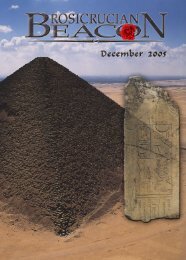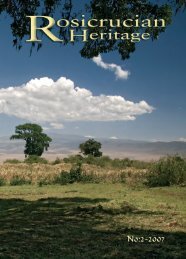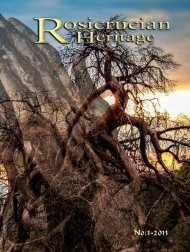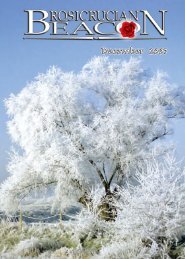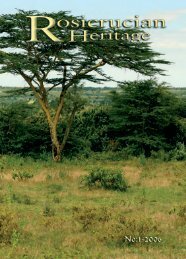Rosicrucian Beacon Magazine - 2012-09 - AMORC
Rosicrucian Beacon Magazine - 2012-09 - AMORC
Rosicrucian Beacon Magazine - 2012-09 - AMORC
- No tags were found...
Create successful ePaper yourself
Turn your PDF publications into a flip-book with our unique Google optimized e-Paper software.
Electro-magnetism: Thales seems to have recorded observations on thephenomenon we call electricity. He noted that when amber was rubbedvigorously with woollen cloth or fur, it attracted to itself other substances.The Greek word for amber is ‘elektron’.in his times as an original thinker, and one who brokewith tradition, not as someone who conveyed existingmythologies. Aristotle unequivocally recorded Thales’hypothesis on the nature of matter, and offered a numberof conjectures based on observation in favour of Thales’declaration. His report provided the testimony that Thalessupplanted myth in his explanations of the behaviour ofnatural phenomena.Thales would have been familiar with Homer’sacknowledgements of divine progenitors but he neverattributed organisation or control of the cosmos to thegods. Aristotle recognised the similarity between Thales’doctrine about water and the ancient legend whichassociates water with the gods Oceanus and Tethys, buthe reported that Thales declared water to be the nature ofall things. To Aristotle, Thales’ theories were so obviouslydifferent from all that had gone before that they stoodapart from all earlier explanations. Thales’ views werenot ancient or primitive, they were new and exciting,and were the genesis of scientific conjecture aboutnatural phenomena. Aristotle acknowledged Thales asthe founder of natural philosophy.Thales was undoubtedly what we would term todaya ‘polymath’, for he investigated virtually all areas ofknowledge: philosophy, history, science, mathematics,engineering, geography and politics. He proposed theoriesto explain many of the events of nature: the primarysubstance, the support of the earth, and the cause ofchange. He was involved in the problems of astronomyand provided a number of explanations of cosmologicalevents which traditionally had been attributed to the gods.His questioning approach to understanding heavenlyphenomena was the beginning of Greek astronomy andphilosophy, which continues today in modern science andthe pursuit of truth found in mysticism.His hypotheses were new and bold, and by freeingphenomena from godly intervention, he paved the waythe rise of scientific endeavour. He founded the Milesianschool of natural philosophy, developed the scientificmethod and initiated the first western enlightenment.He was highly esteemed in ancient times, and a lettercited by Diogenes Laertius, and purporting to be fromAnaximenes to Pythagoras, advised that all discourseshould begin with a solemn reference to Thales.Thales is the first person we know of who proposedexplanations of natural phenomena which were materialisticrather than mythological or theological. His theories werenew, bold, exciting, comprehensible, and possible ofexplanation. He did not speak in riddles like Heraclitus,and had no need to invent an undefined non-substance, asAnaximander did. Because Thales gave no role to mythicalbeings, his theories could be refuted, and arguments couldbe put forward to discredit them, an approach he would nodoubt have approved of. His hypotheses were rational andscientific, and Aristotle, while acknowledging him as thefirst true philosopher, nevertheless criticised his hypothesesin a rational, logical and scientific manner.Twenty-five centuries ago Thales wondered: “Ofwhat and how is the world made? What is the relation ofthe world to the rest of the universe?” The most outstandingaspects of his heritage are: The search for knowledge forits own sake; the development of the scientific method;the adoption of practical methods and their developmentinto general principles; his curiosity and conjecturalapproach to questions of natural phenomena. In the 6 thcentury BCE Thales asked the question, “What is thebasic material of the cosmos?” A complete answer has yetto be discovered!Once again, with the sun rising higher, it was timeto move on; this time to Didyma, following the SacredRoad from Míletus. And I was looking forward to whatI may discover there.Twenty-five centuries ago Thales wondered: “Of what and how is the worldmade? What is the relation of the world to the rest of the universe?”14The <strong>Rosicrucian</strong> <strong>Beacon</strong> -- September <strong>2012</strong>



